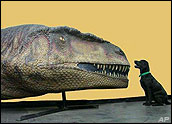
The human tongue could lead to the creation of the super soldier of the future.
Scientists at the Florida Institute for Human and Machine Cognition have found a way to use the tongue to give soldiers extrasensory abilities. A device known as “Brain Port” provides users with owl-like 360-degree vision at night. It gives Navy SEALs whale-like sonar capabilities that allow them to navigate without using a compass — or even their eyes.
Paul Bach-y-Rita, Ph.D., a professor and neuroscientist with the University of Wisconsin-Madison, pioneered the device in 1969 in a project to explore sensory substitution by using electrical impulses to transmit images to the brain via the tongue.
People see with the brain rather than the eyes, says Bach-y-Rita. The brain has the ability to adapt and decode transmitted pulses into visual information whether using eyesight or another sense to gather source material.
Building Super Warriors
A snake can smell with its forked tongue and hear with bones on the side of its head. Some snakes have infrared-sensitive receptors in the grooves between their eyes and nostrils that allow them to see radiated heat.
The Defense Advanced Research Projects Agency, a research and development organization for the Department of Defense, contributed approximately US$350,000 to the study, confirmed DARPA spokesperson Jan Walker.
“We’re interested in investigating the use of this technology as a navigation aid for military divers in murky waters where visibility is extremely limited,” Walker told TechNewsWorld.
Soldiers wear helmet-mounted cameras, sonar and other equipment designed to route signals through a narrow strip of red plastic with 144 microelectrodes from the tongue’s nerve fibers to the brain. The user maintains normal vision while using the system.
The multitasking required to use the system can be as easy as watching and listening to television at the same time. “It does not seem to demand very much cognitive effort if we design the display correctly,” said Anil Raj, Ph.D., project lead scientist at Institute for Human and Machine Cognition.
“We can make it require high concentration, but we choose to use methods that are intuitive,” Raj told TechNewsWorld.
Michael Zinszer, director of Florida State University’s Underwater Crime Scene Investigation School and a veteran Navy diver, completed a test of the device in a swimming pool. He reported sensing an outline of an image and easily found the object of his search. The plastic strip felt like Pop Rocks candies on his tongue, he said.
In May, the research team plans to demonstrate the system to Navy and Marine divers. If the military then decides to adopt it, users will be able to take advantage of enhanced sensory capabilities within three to six months. “The device would allow military divers to swim in a straight line, in a search pattern or to a particular location — tasks that are difficult in conditions of limited visibility,” said DARPA’s Walker.
Being able to provide soldiers with bird-like eyes on the backs of their heads and the ability to see in the dark would provide a substantial benefit to the military.
Copying the snake’s infrared-tongue vision remains a possibility, but that is not likely to be achieved anytime soon.
Uses Outside of the Military
The tongue-sensing technology has many potential applications outside the military as well. Bach-y-Rita and colleagues are seeking to restore sight and also to bring stability to those with destroyed vestibular systems, which can lead to balance problems.
Some people who tried the device to restore balance or as a vision aid were able do things that they previously were unable to do. Some were able to process information with little effort after seconds or minutes of using it, Raj pointed out.
People without sight who tried Brain Port could perceive people walking around them, find doors and catch balls. One woman who lost her balance from antibiotic toxicity and was unable to do normal daily activities tried the Brain Port device. She reported that her balance subsequently improved even while she was not wearing it.
Firefighters and rescue teams might be able to use the Brain Port device to find victims through smoke. “We are also looking at using the system for pilots to help them maintain their spatial awareness and even for people — such as surgeons — who use tele-operated robots, to improve their perception of the environment that the robot is working in,” said Raj.
More advances will come when the project can get more funding to make the hardware smaller and make it wireless. “Once that can be achieved we will have a great deal more opportunity for applications,” said Raj.




















































